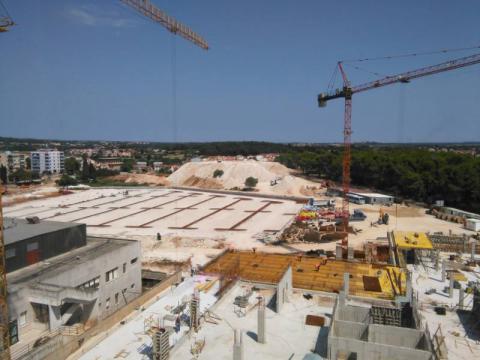City of Pula will cover urban gardens with the surplus excavated from the construction site of the hospital
urban gardens which are located on protected green area vis-a-vis shopping centre Billa will soon become a thing of the past.
That is confirmed by the City of Pula which intends to “arrange” this area by filling earth and rocks from the construction site of the new hospital in Pula.
While Pazin and Zagreb introduced their urban gardens in physical plans, and urban gardeners in Varaždin, Osijek, Velika Gorica, and Sveta Klara enjoy overall support of the local authorities, urban gardens in our town are just obstacles which “use the land in question without a valid legal basis.”
We learn from the City of Pula that the gardens at the above location will be covered in order to plant new, decorative greenery in their place, and fill in the space with the "elements and structures for outdoor living." By covering the gardens with "inert material from the surrounding larger construction sites”, “formerly processed fertile part of the surface land will be maximally preserved," Damir Prhat, Head of the Administrative Department for Municipal System and Property tried to explain, revealing that this is all planned in line with the landscape design project made by the company Urbis in May.
The city of Pula thus confirmed that the fears of urban gardeners from Gregovica, according to whom "the arrangement of the park" is just an excuse for the disposal of surplus excavated from the construction site of the hospital, are grounded at least to some extent. A consolation to the worried residents of Pula should probably be the fact that the filling of the gardens will not be paid by the city, but the Pula General Hospital.
On the other hand, the city will cover "only" the costs of project design, expert supervision services and landscaping of the zone. Let's start only with Urbis’s project, it is about HRK 71,250, according to information included by the City of Pula in the Procurement Plan in early June. Urban gardens from Gregovica are obviously not worth nearly as much for the City of Pula, not to say nothing. It seems that our city fathers do not understand what the sociologists are saying when they say that urban gardens have significant economic and social-therapeutic role and that they are also important for the environmental sustainability of the city. Unfortunately, they understand even less, in the City who is running for European Capital of Culture, that urban gardening is a culture phenomenon, i.e. it is a subculture and lifestyle that implies an active attitude towards the space and the city

